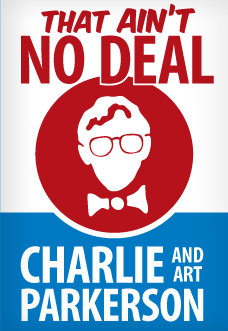This is the introduction to the book I wrote with my father, Charlie Parkerson, to mark his retirement from Lancaster Farms, the business he started and I now manage (along with 100 great employees, that is).
[tw_dropcap]V[/tw_dropcap]ery few real people have catchphrases. The good ones usually belong to fictional characters. We find them in movies, books and TV sitcoms. “Just the facts, Ma’am.” “Shaken, not stirred.” “Good night, John Boy.” “ET phone home.”
It takes an attentive writer (or team of writers) to carefully and intentionally craft a character-defining catchphrase and insert it into dialog for maximum effect. Normal, everyday people like you and me can’t hope to be so consistent.
My father has a catchphrase, one he never planned to have. It was an accident. He never sat down and thought, “What should be my signature saying, and how can I make sure I say it all the time?”
Charlie is almost wholly without artifice. There’s nothing fake about him. He’s the same wherever he goes. He swears at prayer meetings.
And he hates bad deals.
Anyone who has spent more than fifteen minutes with Charlie Parkerson has probably heard him say, “That ain’t no deal.” As his son, I bet I’ve heard it more than anyone, and I have come to realize it’s a good catchphrase, for it captures the essence of my father’s character, the way he thinks and the way he views the world.
As catchphrases go, “That ain’t no deal” may seem pretty negative, but it’s not negative at all. In fact, it’s an incredibly positive statement.
Let me explain why.
Lesson #1: Face the facts
A truly positive outlook, one that is useful and robust, is not a Pollyanna blindness, but rather it acknowledges problems. The world is often screwed up. Optimists don’t deny problems exist or make excuses for them; they simply think they can be fixed.
What is a “deal?” Everything you do is a trade. You spend time, energy and money to get things or do things. You make deals.
It’s your job, especially if you’re a leader, to turn bad deals, which are everywhere, into good deals.
Lesson #2: Conflict is caring
It’s not mean-spirited to point out bad deals when you see them. Confrontation shows you care. It’s a heck of a lot easier to shrug and say, “Whatever.”
“That ain’t no deal,” is not an ad hominem attack. It doesn’t blame. It doesn’t point fingers. It attacks the problem, not the person.
However, when they are confronted, people often take it personally. They hear something that is not being said. They hear, “You’re stupid for doing that,” or “I’m better than you.”
Oversensitivity can blind you to one of the most remarkable things about “That ain’t no deal.” It invites you to step back and see things from a different perspective. Taken literally, it simply asks, “Is this a good trade? Is this how we want things to be?”
So, if it’s not a personal attack, why do the wording and delivery feel so much like an accusation? Why are they so striking?
It’s by design.
Lesson #3: Provoke a response
There’s a safer, less provocative way to say, “That ain’t no deal.” You’ve heard it before: “There has to be a better way.” The meanings are the same.
But the safer words have one problem: they’re boring. They don’t kick you in the pants. They don’t demand a response. Somebody says, “There’s got to be a better way,” and you nod and say, “Yeah, somebody should fix that.”
And then you forget about it, as if they had commented on the weather or said, “The kids these days,” or “Congress needs term limits.”
Safe words are ineffective words.
Here we go
I could go on and on. I could wax philosophical about the colloquial grammar, the irony of the double negative and the expression’s Southern-born roots. But this is Charlie’s book, not mine, and “navel gazing” has never been his style. From here on out, the in-depth mumbo-jumbo and the “what does it all mean?” stuff will be kept to a minimum. You’ll get to hear Charlie explain the ideas and habits that powered his success.
I’ve been a student of my father all my life. For more than thirty years, I have been listening, absorbing his wisdom. It has not been a waste of time. I am sure you will agree!
Arthur Lancaster Parkerson
August 28, 2013
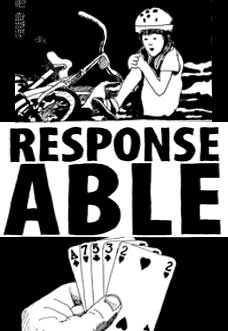 I’m blessed to have five [now six!] grandkids living next door, and I’ve gotten a kick out of teaching them how to do things—really important things—like how to ride a bike and how to play cards.
I’m blessed to have five [now six!] grandkids living next door, and I’ve gotten a kick out of teaching them how to do things—really important things—like how to ride a bike and how to play cards.
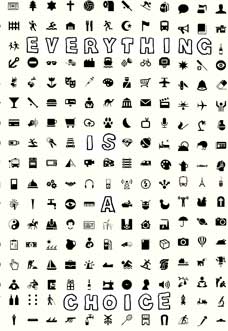
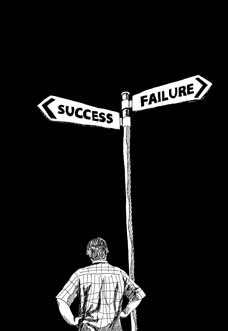 Just as true quality is never a happy accident, neither is success. Good things happen for a reason. Sure, sometimes you’ll get lucky and come out smelling like a rose despite making bad decisions, but that’s like winning the lottery.
Just as true quality is never a happy accident, neither is success. Good things happen for a reason. Sure, sometimes you’ll get lucky and come out smelling like a rose despite making bad decisions, but that’s like winning the lottery.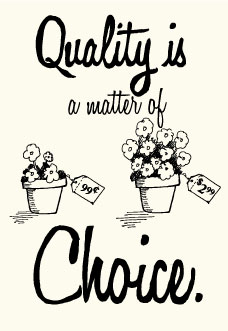 These six words express the heart of my business philosophy. That’s why I made them the motto for Lancaster Farms, the business I founded in 1969.
These six words express the heart of my business philosophy. That’s why I made them the motto for Lancaster Farms, the business I founded in 1969.